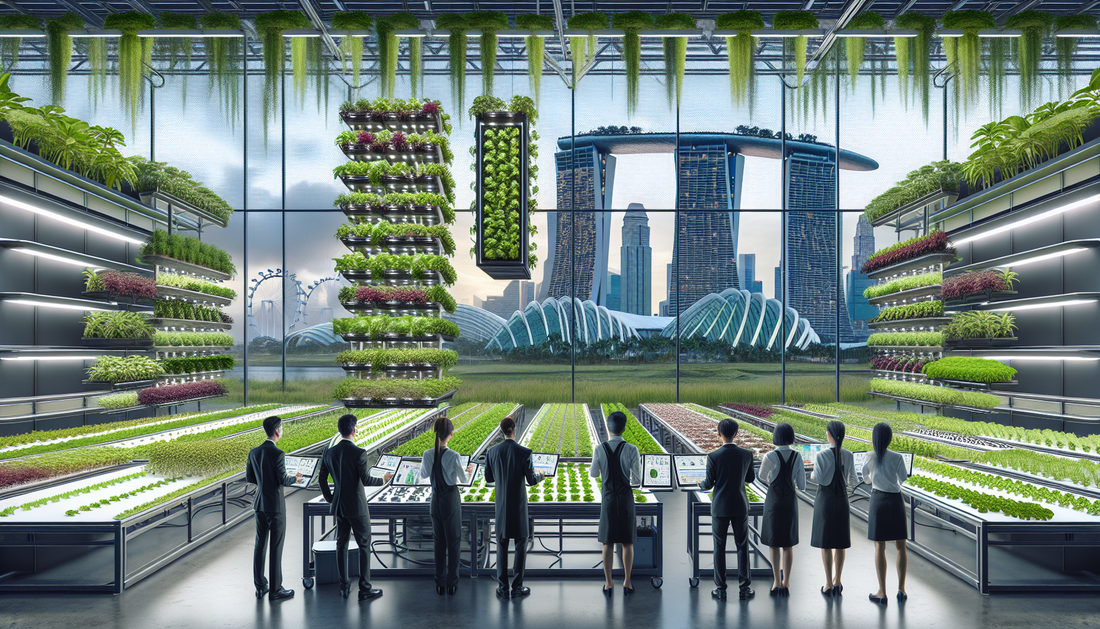
Singapore's Agri-Tech Revolution: Boosting Food Production with Innovation
SizzleBot 3.0 RecipesShare
Singapore's Agri-Tech Revolution has been a beacon of innovation, transforming how the city-state boosts its food production capabilities. Pioneering a sustainable future, Singapore leverages technology to overcome agricultural limitations imposed by its land scarcity.
- 🌿 Urban farming initiatives are flourishing, with vertical farms like Sky Greens leading the charge in sustainable food production, using minimal land and resources.
- 🚜 The Singapore Food Agency (SFA) has been instrumental in fostering agri-tech startups, providing them with funding and resources to innovate and scale.
- 🥬 In 2020, the government launched the 30 by 30 plan, aiming for 30% of nutritional needs to be met with locally produced food by 2030.
- 🌱 Companies like Sustenir Agriculture use controlled environments to grow non-native crops, ensuring a steady supply of fresh produce.
- 🖥️ Cutting-edge technologies such as AI-driven analytics and IoT solutions are optimizing farming processes and increasing yield.
- 🇸🇬 Singapore hosted the Agri-Tech conference in 2022, drawing global experts to brainstorm future trends and solutions.
- 🌏 Collaborative efforts with international partners are enhancing Singapore's agri-tech ecosystem, making it a global hub for agricultural innovation.
In an era marked by rapid urbanization and growing populations, Singapore faces the challenge of producing more food with fewer resources. Dr. Koh Poh Koon, Senior Minister of State for Sustainability and the Environment, emphasizes the critical role of technology and innovation in addressing these challenges. Speaking recently at the opening of the Agri-Food Tech EXPO Asia, Dr. Koh underscored how advancements in agri-tech can potentially transform Singapore's food landscape. The event, which took place from 26th to 28th October 2023 at the Singapore Expo, saw various stakeholders, including technologists, entrepreneurs, and policymakers, gather to discuss the future of food production.
Singapore has been making strides towards achieving the ambitious '30 by 30' goal. This initiative aims to locally produce 30% of the nation's nutritional needs by 2030. With only 1% of land designated for agriculture, harnessing technology is not just advantageous but necessary. Recent innovations, like vertical farming and aquaculture systems, offer promising solutions to boost productivity without expanding the land footprint. At the heart of these innovations is the integration of artificial intelligence and data analytics, which optimize resource use while minimizing environmental impact.
Dr. Koh highlighted several ongoing projects that showcase effective use of technology in agriculture. One such initiative is the deployment of drone technology in urban farming. Drones are being utilized to monitor crop health, manage pests, and improve yield with precision agriculture techniques. Additionally, the use of IoT devices allows farmers to track real-time data on soil health and weather conditions, enabling them to make informed decisions.
The Role of Policy and Innovation Hubs in Agri-Tech Growth
Singapore's government has been proactive in fostering an environment that nurtures innovation in agri-tech. Policies crafted to support research and development funding and public-private partnerships are key drivers of technological advancement. The country's agri-tech ecosystem is further strengthened by strategic innovation hubs like the newly established Agri-Food Innovation Park. Located in Lim Chu Kang, this park acts as a breeding ground for different food production and innovative farming systems, encouraging collaborations between various sectors.
Key players in this ecosystem include both local startups and global agri-tech giants. Companies are increasingly using Singapore as a testbed for new technologies, pilot projects, and commercialization efforts. This collaborative environment is instrumental in propelling Singapore towards meeting its '30 by 30' targets through shared expertise and resources.
Emerging Technologies Transforming Singapore's Food Landscape
Vertical farming is among the most promising innovations in the urban agricultural scene. By growing crops in stacked layers, vertical farms utilize significantly less land compared to traditional farming methods. Companies like Sky Greens and Sustenir Agriculture are leading examples, using aeroponics and hydroponics systems to optimize crop growth. These systems not only save land but also reduce water consumption by up to 90% compared to traditional methods.
Another emerging technology is aquaculture. With Singapore's surrounding waters, developing sustainable fish farming techniques is a logical step forward. Technology is being deployed to breed fish more efficiently and with fewer environmental impacts. High-association-with-tech solutions include automated feeding systems and sensors that monitor water conditions to maintain optimal environments for fish growth.
Looking Ahead: Singapore's Commitment to Sustainable Food Production
The path forward relies heavily on continued commitment to innovative practices and collaborative efforts. Dr. Koh reiterated Singapore’s dedication to strengthening its food security through sustainable practices and technological advancements. Public awareness and consumer acceptance remain essential elements, as technologically driven food production methods require societal buy-in to thrive.
Global partnerships are also pivotal to this vision, as Singapore is seeking to leverage worldwide expertise and technological capabilities to enhance its agri-food sector. By opening its doors to international tech firms and researchers, Singapore aims to attract talent and investment, further positioning itself as a global nexus for agri-tech innovation.
Conclusion: Building a Resilient Food Ecosystem
Singapore is poised to lead the way in demonstrating how technology and innovation can create a sustainable and resilient food ecosystem. The convergence of government policy, technological advancements, and international collaboration lays a robust foundation for achieving the ambitious '30 by 30' goal. As other countries look to balance urban growth with food security, Singapore’s model offers valuable insights into how cities can transform their approaches to agriculture in the digital age.
The journey to revolutionize food production is ongoing, and with committed leadership and community engagement, Singapore can look forward to not just meeting its nutritional needs but setting global standards for future urban agriculture.











